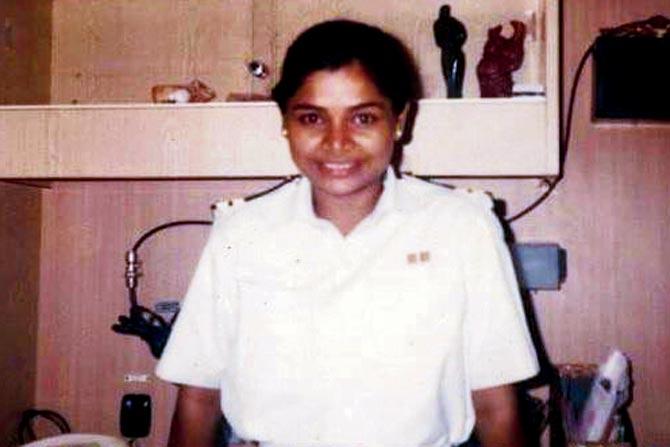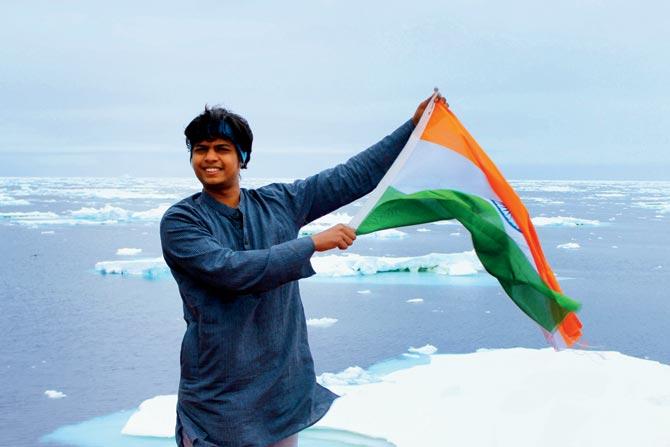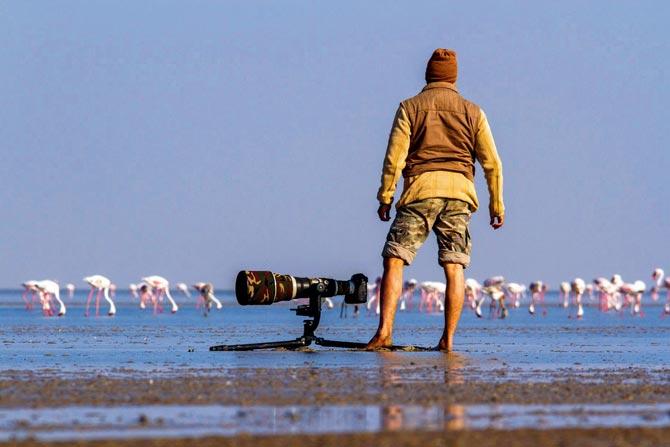As self-isolation becomes a way of life, professionals across fields who have experienced extreme seclusion tell you how to stay afloat when no one and nothing is around

Shridhar Jawak, polar scientist, conducted three polar expeditions in Antarctica from 2011-2016
NASA astronaut Anne McClain realised how the abrupt confinement that came with the lockdown of most countries across the world to contain the Coronavirus outbreak, would prove challenging for the world. On March 23, McClain—who has spent 204 days on the International Space Station between 2018 and 2019—began sharing good examples of successful self-isolation on Twitter. In a Twitter thread, she talks about the expert skills astronauts implement when working and living in confinement to ensure that they stay happy, productive and successful.
ADVERTISEMENT
Taking a cue from her, we put together a panel of four experts whose occupation takes isolation to a whole new level. So, as the pandemic has you feeling cabin fever, they have advice that will help you escape boredom.
'Dedicated private time is most important'

Rajeshwari Kori, the only female officer onboard a warship, was provided a private room with an attached bathroom on INS Jyoti
Rajeshwari Kori
Retired Navy officer
After completing her schooling from Kendriya Vidyalaya in Mumbai and pursuing Bachelor of Commerce degree, Cdr Rajeshwari Kori (Retd.) joined the Indian Navy in 1995. The following year, Kori requested the authorities to post her onboard a warship. "A warship is the backbone of the navy. While female officers are trained with male course mates, they think of us as the weaker link. We are called glamour dolls who only come into the limelight during VIP events, and are deemed incapable of working on a warship. But my parents had educated me and I wasn't going to miss out on this opportunity."
So in 1997, Kori got an offer to serve as a logistics officer onboard INS Jyoti—a major force multiplier in sustaining the navy's blue water operations. Kori, the first Indian woman to have sailed on board a warship, says she reported with a complement of 25 officers and 130 sailors, all male. "For one whole year, I sailed to Visakhapatnam and abroad countries like Singapore, Philippines, etc. My duties mainly involved looking into the allowances of the crew members, ration, uniforms and accessories. While we used to make pitstops, my home was a compact room on the ship itself that came with an attached bathroom."
Kori's day would begin at 5 am, till all her duties were finished by 3 pm. "We would then organise some sports to kill time. But, around 8.30 pm, I would retire to my room. How much longer can you sit with men? I understood the sensitivity that it was their area of play and did not intrude. In my room, there was no TV or VCR to watch films. So, I would read novels."
Kori knew this was going to be a challenging experience, so she had already applied for an HRD management course. "I had carried my books onboard, so I would use the night hours to study. It kept my sanity. It is a habit that has stayed with me."
After a successful afloat tenure, she retired from the navy in 2008. "But even today in the lockdown in my Powai home, I retire as early as 9.30 pm to read. I absolutely love this time of the day. I feel it is very important for everyone to have this private time for self-care and self-learning."
'Establish routine, but remember to have some fun'

On some pleasant days in Antarctica, Shridhar Jawak would take a walk near the research station Bharati
Shridhar Jawak
Polar scientist
Between 2011 and 2016, Pune-based Shridhar Jawak conducted three major field expeditions to Antarctica. With a crew of 20 researchers in tow, Jawak not just contended with dangerous crevasses, but also with the hard truths of life. "We were assigned to cross-check observations that you receive from the satellite. All three trips to Antarctica were during the austral summer, between October and February, when there is 24-hour sunlight. The sun never goes down. So, you can imagine how you'd become an insomniac, at least in the initial days."
Of the five months that he lived at the research station called Bharati, field work was possible for merely 20 days. "On the remaining days, we were confined to the station and our rooms. This is when differences with teammates begin to surface. But you must remember to keep calm as they are going to be your only family during the mission."
Jawak, now 31, highlights leadership as well as followership. "You must know when to step back and follow another's lead, and begin a routine together. You cannot always lead the troupe; you need to understand everyone is equal."
Unpredictability is the only constant in Antarctica. "So if you sleep at night in pleasant weather, the next day, you wake up to a blizzard. Life there is mostly unpredictable. So, you need to set a routine. This provides structure and ends monotony. You need to wake up at a particular hour, do your duties and go back to sleep without feeling unproductive."
During such assignments, you also begin to value time, Jawak adds. "Even if you miss your family back home, you can only call them once every month through a satellite phone that goes off after six minutes. There are days when you are lonely, but you keep the momentum going by watching movies, doing mimicry, celebrating birthdays and anniversaries of crew members, and just laughing it all away."
Jawak, who is currently a remote sensing officer in the Arctic, says he lives in the most isolated part of Norway called Svalbard. "The population here is barely 2,500. When the lockdown was imposed to contain the spread of Coronavirus, everyone was almost fine with confinement. It is a way of life here. And my Antarctica stint had already trained me into enjoying this loneliness, so it's all the more easy now. The key is to have fun in whatever little way possible."
'Keep busy and find yourself a new goal'

Award-winning photographer Sudhir Shivaram in Little Rann of Kutch, Gujarat in 2012
Sudhir Shivaram
Wildlife photographer
Sudhir Shivaram grew interested in wildlife photography in 1993 while studying engineering in Hassan, Karnataka. With almost 25 years of experience in the field, Shivaram was named Sanctuary Asia's Wildlife Photographer of the Year in 2012. Now 48, he spends days alone in the wilderness taking perfect shots of various species. "My longest assignment so far has been at Barnawapara Wildlife Sanctuary in Chhattisgarh, where I stayed for almost a week. I was invited on behalf of the Chhattisgarh Tourism Board to shoot local species. They arranged a gypsy and a driver to ferry me inside the reserve. On some days, I would spend hours waiting for the alarm calls of animals. On most other days, I would get lucky and spot some exotic species. You need to be very patient."
Shivaram agrees that his job gets lonely on most days. "But I enjoy this. The peace in nature is something I have adapted myself to over many years. In the initial days of my career, we were allowed to venture in the jungles all by ourselves without any basic facilities. So I would frequent Biligiriranga Hills in Karnataka, Bandhavgarh in Madhya Pradesh and some other remote places in the North East. Things have, however, changed now and the authorities do not allow you to go alone."
Before the lockdown was imposed, Shivaram was on an assignment at Kaziranga National Park in Assam. "On March 16, we took some shots in the buffer area of the park and the next day we were told that the facility had been shut down. I flew back home to Karnataka and was in self-quarantine for 10 days. I enjoyed the first few days of isolation, but after a month of lockdown, I realised I was being caged in my own home. It was quite unsettling."
Shivaram gathered himself and started helping his wife with household chores. "I didn't know what to do in my free time. So I took to social media, and started holding online photography workshops. I did Facebook Live and Instagram Live to keep my passion alive everytime I found it waning."
Shivaram says it is important to find a new goal or hobby in the lockdown. "There are two kinds of people; those who whine and crib about being locked up in their home and then there are those who use this time for their benefit. I've started interacting with lots of people online, I motivate them, tell them to find a goal just like I did."
'Keep hope alive, but don't wish away your days'

A forward camp of the Indian army in July 1991 at 16,000 feet (upper part of glacier) and 45 miles up on a 75 mile Siachen Glacier. Representation pic/AFP
Raghu Raman,
Retired Indian Army officer
Captain Raghu Raman (Retd.) spent 11 years as an officer in the Indian Armed Forces, followed by another 11 years in the corporate sector before joining the Government as CEO of the National Intelligence Grid (NATGRID). During his stint in the Army, he was posted in the Siachen Glacier facing Pakistani troops. "Words cannot express the harshness of fighting at the world's highest battlefield. Manning a post at -40 degrees Celsius is not a joke. But we are trained to do this."
The only sign of life is the glacier itself. "In what we call the summers, you may be lucky to spot a snow leopard but that is about it." Raman, now 54, carried a pack of Game of Patience with him to play during his free time in the bunker. "Apart from officers passing through the post, I didn't have any visitors. So, I would kill time by playing card games alone or watching the same movie for the 80th time. You cannot sleep up there; somehow sleep does not come easily to you in Siachen. So, I would also read a lot."
After having canned food for months, Raman returned to civilisation and was invited for a meal at his friend's home in Ambala. "That was the first real meal I had in months. I started valuing the little things when life returned to normalcy."
When the authorities issued a red alert in Mumbai before Cyclone Nisarga last week, Raman, who is currently in lockdown at his Mumbai home, wondered where the poor would seek shelter. "There are so many slum pockets, where would the residents go? I feel all of us, rich and poor, are facing the harsh reality of day-to-day existential survival. Some make it, others don't."
Raman highlights the Stockdale Paradox, a term coined by author Jim Collins in his book, Good to Great. "It was named after James Stockdale, former vice presidential candidate, naval officer and Vietnam prisoner of war. Stockdale was held captive in Hanoi in 1965. For the next seven-and-a-half years, he underwent immense torture. The only thing that kept him going was hope. He always knew that he would return to his family. When interviewed by Collins, he said that these were the most defining years of his life, which in hindsight, he would not trade for anything else."
Raman feels all of us must believe that we will emerge from this situation. "This will pass; it has to. You need to keep the hope alive. But at the same time, you don't wish away the harsh reality. Take each day as it comes, learn something."
Catch up on all the latest Mumbai news, crime news, current affairs, and a complete guide from food to things to do and events across Mumbai. Also download the new mid-day Android and iOS apps to get latest updates.
Mid-Day is now on Telegram. Click here to join our channel (@middayinfomedialtd) and stay updated with the latest news
 Subscribe today by clicking the link and stay updated with the latest news!" Click here!
Subscribe today by clicking the link and stay updated with the latest news!" Click here!






